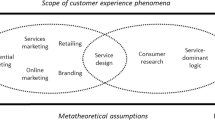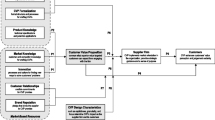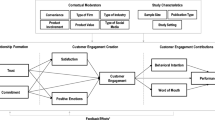Abstract
It is now well established from a variety of studies, that service recovery is essential for service providers to retrieve the customer’s satisfaction after the service failure. Recent evidence suggests that the co-creation of service recovery has a positive outcome for both service providers and customers. However, very little is currently known about the impact of customers’ cultural orientations in implementing co-creation of service recovery. In the present research, using an experimental design, first we examined the impact of co-creation on the perception of outcome favorability for the customers with high/low cultural values orientations and second, we measure the influence of perception of outcome favorability on the customer’s post-recovery responses. The result revealed that the co-creation of recovery attributes is indeed associated with a higher perception of outcome favorability for customers with higher cultural values. The result also indicated that the customer’s perception of outcome favorability is positively associated with satisfaction and repurchase intention.
Similar content being viewed by others
References
Akaka M, Schau S, & Vergo S (2013) The co-creation of value-in-cultural-context. Research in Consumer Behavior 15(10): 265–284.
Bateson J (1985) Self-service consumer: An exploratory study. Journal of Retailing 61(3): 49–75.
Bitner MJ, Brown SW, & Meuter ML (2000) Technology infusion in service encounters. Journal of the Academy of Marketing Science 28(1): 138–149.
Blodgett JD, Granbois DH, & Walters RG (1993) The effects of perceived justice on complainants’ negative word-of-mouth behavior and repatronage intentions. Journal of Retailing 64(4): 399–428.
Brdiger EK & Wood A (2017) Gratitude mediates consumer responses to marketing communications. European Journal of Marketing 51(1): 44–64.
Carù A & Bernard C (2015) Co-creating the collective service experience. Journal of Service Management 26(2): 276–294.
Cavusgil TS & Das A (1997) Methodology issues in cross-cultural sourcing research-a primer. Marketing Intelligence & Planning 15(5): 213–220.
Dabholkar PA (1996) Consumer evaluations of new technology-based self-service options. International Journal of Research in Marketing 13(1): 29–51.
Dong B, Evans KR, & Zou S (2008) The effects of customer participation in co-created service recovery. Journal of the Academy of Marketing Science 36(1): 123–137.
Donthu N & Yoo B (1998) Cultural influences on service quality expectations. Journal of Service Research 1(2): 178–186.
Fiske AP, Markus HR, & Nisbett R (1998) The Cultural Matrix of Social Psychology. In Gilbert DT, Fiske ST, & Lindzey G (Eds.), The handbook of social psychology. New York, NY, US: McGraw-Hill: 915–981.
Fornell C & Larcker DF (1981) Valuating structural equation models with unobservable variables and measurement error. Journal of Marketing Research 18(1): 39–50.
Fornell C & Wernerfelt B (1987) The vicious circle of consumer complaints. Journal of Marketing 48(2): 68–78.
Galvagno M & Dalli D (2014) Theory of value co-creation. a systematic literature review. Managing Service Quality 24(6): 643–683.
Gelbrich K & Roschk H (2011) Do complainants appreciate overcompensation? A meta-analysis on the effect of simple compensation vs. overcompensation on post-complaint satisfaction. Marketing Letters 22(1): 31–47.
Grönroos C (2008) Service logic revisited: Who creates value? and who co-creates?. European Business Review 20(4): 298–314.
Guo L, Lotz SL, Tang C, & Gruen TW (2016) The role of perceived control in customer value cocreation and service recovery evaluation. Journal of service research 19(1): 39–56.
Hazée S, Van Vaerenbergh Y, & Armirotto V (2017) Co-creating service recovery after service failure: The role of brand equity. Journal of Business Research 74(C): 101–109.
Hellier PK, Carr R, Geursen GM, & Rickard JA (2003) Customer repurchase intention: A general structural equation model. European Journal of Marketing 37(11): 1762–1800.
Hofstede G (1980) Culture’s consequences: International differences in work-related values. Beverly Hills(CA). Sage.
Hofstede G, Hofstede GJ, & Minkov M (1991) Culture and organizations — software of the mind: Intercultural Cooperation and Its Importance. New York, NY: McGraw-Hill.
Holbrook MB (1996) Consumer value: A framework for analysis and research. in Corfman KP, & Lynch JG (eds) Advances in Consumer Research, Provo, UT: Association for Consumer Research 23: 138–42.
Jung NY & Seock YK (2017) Effect of service recovery on customers’ perceived justice, satisfaction, and word-of-mouth intentions on online shopping websites. Journal of Retailing and Consumer Services 37(C): 23–30.
Kale S & Mclntyre RP (1991) Distribution channel relationships in diverse cultures. International Marketing Review 8(3): 35–41.
Kellogg D, Youngdahl WE, & Bowen DE (1997) On the relationship between customer participation and satisfaction: two frameworks. International Journal of Service Industry Management 8(3): 206–219.
Kulik CT & Ambrose ML (1992) Personal and situational determinants of referent choice. The Academy of Management Review 17(2): 212–237.
Lusch RF, Vargo SL, & O’Berien M (2007) Competing through service: Insights from service-dominant logic. Journal of Retailing 83(1): 5–18.
Lusch R & Vargo SL (2006) The Service-Dominant Logic of Marketing: Dialog, Debate, and Directions. Armonk, NY: ME Sharpe.
Lynn M, Zinkhan GM, & Harris J (1993) Consumer tipping: A cross-country study. Journal of Consumer Research 20(3): 478–488.
Oliver RL & Swan JE (1989) Consumer perceptions of interpersonal equity and satisfaction in transactions: A field survey approach. Journal of Marketing 53(2): 21–35.
Oliver RL (1997) Satisfaction: A Behavioral Perspective on the Consumer. New York: Prince Hill.
Park J & Ha S (2016) Co-creation of service recovery: Utilitarian and hedonic value and post-recovery responses. Journal of Retailing and Consumer Services 28(January): 310–316.
Patterson PG & Smith T (2001) Relationship benefits in service industries: A replication in a Southeast Asian context. Journal of Services Marketing 15(6/7): 425–443.
Patterson PG, Cowley E, & Prasongsukarn K (2006) Service failure recovery: The moderating impact of individual-level cultural value orientation on perceptions of justice. International Journal of Research in Marketing 23(2): 263–277.
Prahalad CK & Ramaswamy V (2004) Co-creation experiences: The next practice in value creation. Journal of Interactive Marketing 18(3): 5–14.
Rashid MHA, Ahmad FS, & Othman A K (2014) Does service recovery affect customer satisfaction?. Social and Behaviural Sciences 130(May): 455–460.
Roggeveen AL, Tsiros M, & Grewal D (2012) Understanding the co-creation effect: When does collaborating with customers provide a lift to service recovery?. Journal of the Academy of Marketing Science 40(6): 771–790.
Sánchez-Fernández RM & Iniesta-Bonillo A (2007) The concept of perceived value: A systematic review of the research. Marketing Theory 7(4): 427–451.
Smith AK, Bolton RN, & Wagner J (1999) A model of customer satisfaction with service encounters involving failure and recovery. Journal of Marketing Research 36(3): 356–372.
Smith PB & Dugan S (1996) National culture and the values of organizational employees. Journal of Cross-Cultural Psychology 27(2): 231–264.
Soares AM (2004) The influence of culture and consumers: Exploratory and risk taking behaviour. Unpublished Doctoral Dissertation, Braga:University of Minho.
Solomon MR., Surprenant C, Czepiel JA, & Gutman GE (1985) A role theory perspective on dyadic interactions: The service encounter. Journal of Marketing 49(Winter): 99–111.
Steenkamp JB (2001) The role of national culture in international marketing research. International Marketing Review 18(1): 30–44.
Stepina LP, Perrewe PL, Hassell BL, & Harris JR (1991) A comparative test of the independent effects of interpersonal, task, and reward domains on personal and organizational outcomes. Journal of Social Behavior & Personality 6(1): 93–104.
Tax SS, Brown SW, & Chandrashekaran M (1998) Customer evaluations of service complaint experiences: Implications for relationship marketing. Journal of Marketing, 62(April): 60–76.
Triandis H & Suh E (2002) Cultural influences on personality. Annual review of psychology 53: 60–133.
Thibaut J & Walker L (1975) Procedural justice: A psychological analysis. Hillsdale: Lawrence Erlbaum Associates.
Vargo SL & Lusch R (2004) Evolving to a new dominant logic. Journal of Marketing 68(1): 1–17.
Xu Y, Marshall R, Edvardsson B, & Tronvoll B (2014) Show you care: Initiating co-creation in service recovery. Journal of Service Management 25(3): 369–387.
Yi Y & Gong T (2013) Customer value co-creation behavior: Scale development and validation. Journal of Business Research 66(9): 1279–1284.
Author information
Authors and Affiliations
Corresponding author
Additional information
Publisher’s Note Springer Nature remains neutral with regard to jurisdictional claims in published maps and institutional affiliations.
Author Biographies
Naghmeh Nik Bakhsh is a PhD student of Business Administration at Tallinn University of Technology in Estonia. She holds a bachelor’s degree from Industrial engineering and master’s degree from MBA. Her research interests include areas such as service recovery, customer behavior, cross-cultural studies.
Rights and permissions
About this article
Cite this article
Bakhsh, N.N. Co-creation of Service Recovery and Post-Recovery Responses: The Impact of Cultural Values Orientations and Outcome Favorability. J Serv Sci Res 11, 133–155 (2019). https://doi.org/10.1007/s12927-019-0007-4
Received:
Accepted:
Published:
Issue Date:
DOI: https://doi.org/10.1007/s12927-019-0007-4




